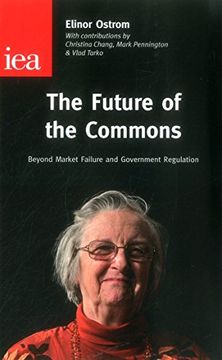Compartir
The Future of the Commons: Beyond Market Failure & Government Regulations (Institute of Economic Affairs: Occasional Papers) (en Inglés)
Elinor Ostrom (Autor)
·
Institute Of Economic Affairs
· Tapa Blanda
The Future of the Commons: Beyond Market Failure & Government Regulations (Institute of Economic Affairs: Occasional Papers) (en Inglés) - Elinor Ostrom
Libros de textos
$ 31.256
$ 52.093
Ahorras: $ 20.837
Elige la lista en la que quieres agregar tu producto o crea una nueva lista
✓ Producto agregado correctamente a la lista de deseos.
Ir a Mis Listas
Origen: Estados Unidos
(Costos de importación incluídos en el precio)
Se enviará desde nuestra bodega entre el
Martes 28 de Mayo y el
Jueves 06 de Junio.
Lo recibirás en cualquier lugar de Argentina entre 1 y 3 días hábiles luego del envío.
Reseña del libro "The Future of the Commons: Beyond Market Failure & Government Regulations (Institute of Economic Affairs: Occasional Papers) (en Inglés)"
Traditional economic models of how to manage environmental problems relating to renewable natural resources, such as fisheries, have tended to recommend either government regulation or privatisation and the explicit definition of property rights. These traditional models ignore the practical reality of natural resource management. Many communities are able to spontaneously develop their own approaches to managing such common-pool resources. In the words of Mark Pennington: '[Professor Ostrom's] book Governing the Commons is a superb testament to the understanding that can be gained when economists observe in close-up detail how people craft arrangements to solve problems in ways often beyond the imagination of textbook theorists.' In particular, communities are often able to find stable and effective ways to define the boundaries of a common-pool resource, define the rules for its use and effectively enforce those rules. The effective management of a natural resource often requires 'polycentric' systems of governance where various entities have some role in the process. Government may play a role in some circumstances, perhaps by providing information to resource users or by assisting enforcement processes through court systems. Elinor Ostrom's work in this field, for which she won the Nobel Prize in economics in 2009, was grounded in the detailed empirical study of how communities managed common-pool resources in practice. It is essential that we avoid the 'panacea problem'. There is no correct way to manage common-pool resources that will always be effective. Different ways of managing resources will be appropriate in different contexts - for example within different cultures or where there are different physical characteristics of a natural resource. Nevertheless, there are principles that we can draw from the detailed study of the salient features of different cases to help us understand how different common-pool resources might be best managed; which rules systems and systems of organisation have the best chance of success or failure; and so on. Elinor Ostrom's approach has been praised by the left, who often see it as being opposed to free-market privatisation initiatives. In fact, her approach sits firmly within the classical liberal tradition of political economy. She observes communities freely choosing their own mechanisms to manage natural resource problems without government coercion or planning. In developing a viable approach to the management of the commons, it is important, among other things, that a resource can be clearly defined and that the rules governing the use of the resource are adapted to local conditions. This suggests that rules imposed from outside, such as by government agencies, are unlikely to be successful. There are important areas of natural resource management where Elinor Ostrom's ideas should be adopted to avoid environmental catastrophe. Perhaps the most obvious example relevant to the UK is in European Union fisheries policy. Here, there is one centralised model for the management of the resource that is applied right across the European Union, ignoring all the evidence about the failure of that approach.
- 0% (0)
- 0% (0)
- 0% (0)
- 0% (0)
- 0% (0)
Respuesta:
Todos los libros de nuestro catálogo son Originales.
Respuesta:
El libro está escrito en Inglés.
Respuesta:
La encuadernación de esta edición es Tapa Blanda.
✓ Producto agregado correctamente al carro, Ir a Pagar.

